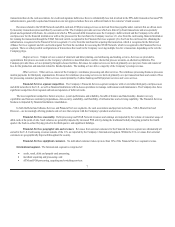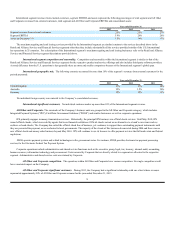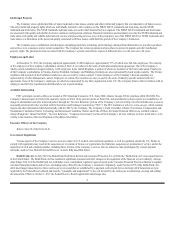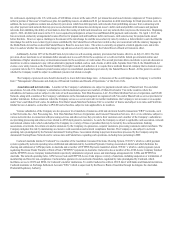First Data 2013 Annual Report Download - page 18
Download and view the complete annual report
Please find page 18 of the 2013 First Data annual report below. You can navigate through the pages in the report by either clicking on the pages listed below, or by using the keyword search tool below to find specific information within the annual report.
The Company relies on various financial institutions to provide clearing services in connection with its settlement activities. If the Company is
unable to maintain clearing services with these financial institutions and is unable to find a replacement, the Company’s business may be
adversely affected.
The Company relies on various financial institutions to provide clearing services in connection with the settlement activities of the Company. If such
financial institutions should stop providing clearing services the Company must find other financial institutions to provide those services. If the Company is
unable to find a replacement financial institution the Company may no longer be able to provide processing services to certain customers which could
negatively impact the revenue and earnings of the Company.
Changes in laws, regulations and enforcement activities may adversely affect the products, services and markets in which the Company operates.
The Company and its customers are subject to laws and regulations that affect the electronic payments industry in the many countries in which the
Company’s services are used. In particular, the Company’s customers are subject to numerous laws and regulations applicable to banks, financial
institutions and card issuers in the United States and abroad, and, consequently, the Company is at times affected by these federal, state and local laws and
regulations. The U.S. Congress and governmental agencies have increased their scrutiny of a number of credit card practices, from which some of the
Company’s customers derive significant revenue. Regulation of the payments industry, including regulations applicable to the Company and its customers,
has increased significantly in recent years. Failure to comply with laws and regulations applicable to the Company’s business may result in the suspension or
revocation of licenses or registrations, the limitation, suspension or termination of services, and/or the imposition of consent orders or civil and criminal
penalties, including fines which could have an adverse effect on the Company’s results of operation and financial condition. The Company is subject to U.S.
and international financial services regulations, a myriad of consumer protection laws, economic sanctions, laws and regulations and anti-corruption laws,
escheat regulations and privacy and information security regulations to name only a few. Changes to legal rules and regulations, or interpretation or
enforcement thereof, could have a negative financial effect on the Company. In particular, the Dodd-Frank Wall Street Reform and Consumer Protection Act of
2010 (the “Dodd-Frank Act”), which was signed into law in July 2010, significantly changes the U.S. financial regulatory system, including creating a new
independent agency funded by the Federal Reserve Board, the Consumer Financial Protection Bureau (“CFPB”), to regulate consumer financial products and
services (including many offered by the Company’s customers), restricting debit card fees paid by merchants to issuer banks and allowing merchants to offer
discounts for different payment methods. On June 29, 2011, the Federal Reserve Board (the “FRB”) announced final rules governing debit card interchange
fees, and routing and exclusivity restrictions as well as a proposed rule governing the fraud prevention adjustment in response to the Dodd Frank Act. On
July 31, 2013, the United States District Court for the District of Columbia instructed the FRB to vacate the interchange fee and network exclusivity
restrictions and develop new rules in compliance with the Dodd Frank Act. The FRB has appealed that decision, the district court has stayed its ruling
pending appeal, and the rules remain in effect pending appeal. Within the Retail and Alliance Services segment the Company experienced some transitory
benefit under the original rules due mostly to lower debit interchange rates, however, the overall impact of the Dodd-Frank Act on the Company is difficult to
estimate until the interchange fee and network exclusivity restrictions are settled through the federal appeals process and the market and regulators have time to
react and adjust to any potential new regulations that could be required as an outcome of the judicial process. Separately, additional regulations have been
proposed and developed by the newly created CFPB, with respect to consumer financial products and services that impact the Company or its customers.
Pursuant to final rules published by the CFPB in the areas of check verification and consumer debt collection, two of the Company’s subsidiaries, TeleCheck
Services Inc. and TRS Recovery Services, Inc., are subject to CFPB oversight, supervision and examination. As a result of the Dodd Frank Act, the CFPB
was given jurisdictional authority to regulate, supervise, and examine consumer prepaid products and services. The Company has a business focused on the
development and delivery of prepaid solutions for customers, but it is unclear how or whether the CFPB will develop a regulatory regime that impacts these
solutions. Each of the proposed or potential regulations may adversely affect the Company’s business or operations, directly or indirectly (if, for example, the
Company’s customers’ business and operations are adversely affected). In addition, an inadvertent failure by the Company to comply with laws and
regulations, as well as rapidly evolving social expectations of corporate fairness, could damage the Company’s reputation or brands. Furthermore, the
Company is subject to tax laws in each jurisdiction where it does business. Changes in tax laws or their interpretations could decrease the value of revenues the
Company receives, the value of tax loss carryforwards and tax credits recorded on the Company’s balance sheet and the amount of the Company’s cash flow
and have a material adverse impact on the Company’s business.
The Company is subject to the credit risk that its merchants will be unable to satisfy obligations for which the Company may also be liable.
The Company is subject to the credit risk of its merchants being unable to satisfy obligations for which the Company also may be liable. For example,
the Company and its merchant acquiring alliances are contingently liable for transactions originally acquired by the Company that are disputed by the
cardholder and charged back to the merchants. If the Company or the alliance is unable to collect this amount from the merchant, due to the merchant’s
insolvency or other reasons, the Company or the alliance will bear the
17
























